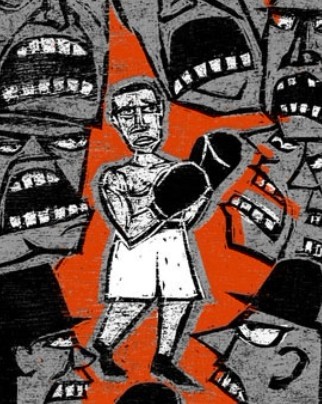Books and Arts; Book Review;Racism in sport;
The black white hope;
The Longest Fight: In the Ring with Joe Gans, Boxing's First African-American Champion. By William Gildea.
“THE whitest black man that ever entered the ring,” said a famous American sports writer a century ago in praise of Joe Gans. Given the place and the time, the comment was unexceptional. It is Gans's reaction to the insulting words that still astounds. Far from being offended, the first American-born black boxer to win a world title regarded it instead as a compliment. So, less remarkably, did his numerous white fans.

一百年前,某位著名的美國體育記者曾這樣贊賞喬甘斯:“他是拳擊場里最受白人擁戴的黑人。”彼時彼地,這絕不是一條普普通通的評價。甘斯對別人的侮辱有著驚人的忍耐力。對于首位贏得世界第一的美國本土黑人拳擊手來說,這樣的評價絕不是冒犯,而是褒揚。就連他不計其數的白人粉絲聽后也感到甘之如飴。
Against enormous odds, as William Gildea recalls in his episodic biography, Gans had by 1906 achieved the seemingly impossible. He actually left the ring a popular winner in successfully defending his title against Battling Nelson, a Danish-American, in Goldfield, Nevada. Even grizzled prospectors whooped when, after two hours and 48 minutes, the longest championship fight of the 20th century, Nelson was disqualified for a deliberate low blow.
威廉吉爾迪亞在傳記里回憶到,雖然困難重重,但是甘斯在1906年做到了似乎不可能做到的事情。他挫敗了來自內華達州金礦市的美裔丹麥選手貝特林納爾遜,成功地捍衛了自己世界第一的稱號,以最受擁戴的勝者姿態告別了拳擊場。這場耗時兩小時四十八分鐘的比賽是20世紀最漫長的拳擊賽,當納爾森因蓄意打在甘斯的腰下部位而被判出局時,就連頭發花白的老礦工也大聲吶喊起來。
Extraordinary stoicism earned Gans his lasting popularity in America. Born and brought up in Maryland, a state bordering on the old Confederacy, he had to put up with the everyday humiliations suffered by all African-Americans there. And, on top of these, he had also to tolerate the particular horrors suffered by America's black sportsmen.
超凡的忍耐力為甘斯贏得了美國人民經久不衰的愛戴。喬甘斯生在馬里蘭,長在馬里蘭,這個州緊挨著老聯盟,他每天都要忍受當地所有美裔黑人都會遭受的羞辱。除此之外,他還要忍受美國黑人運動員都會遭受的恐嚇。
Gans, a naturally polite and cheerful man, was tutored always to show restraint by Bob Fitzsimmons, a world champion at three weights, who argued that you should do as you would be done by. In consequence, Gans learnt to remain impassive in the face of the most egregious provocations: even, for instance, when one opponent called him “133 pounds of black meat” and when another spat in his face as they squared up in the centre of the ring.
喬甘斯天性謙和開朗,世界冠軍鮑勃費茨西蒙斯教會了他忍耐,因為鮑勃主張“己所不欲,勿施于人”。后來,甘斯學會了對于種種惡意挑釁漠然視之,就算有對手戲謔他是“133磅的黑肥肉”,就算在拳擊場角斗時對手向他臉上啐唾沫,他也絕不動怒。
Like other black boxers, Gans was exploited by the low-life types that inhabited professional boxing. Promoters paid him less than his white rivals, even when he was the main draw. His sleazy manager, Al Herford, bet heavily against Gans in two fights and then ordered him to lose. Gans eventually sacked his manager, confessed to the fixed fights, won international recognition as a fine champion and was mourned by thousands, white and black, at his funeral in Baltimore, when he died from tuberculosis at the then typically early age of 35.
和其他黑人拳擊手一樣,甘斯也要遭到職業拳擊行業里手段卑鄙的剝削。雖然雙方打平,贊助商付給甘斯的酬勞卻比付給他白人對手的要少。他下作的經紀人阿爾赫福德下了大注賭喬甘斯輸,于是他便命令喬甘斯必須輸。甘斯最后解雇了他的經紀人,并向公眾坦承自己操縱了比賽,甘斯因此贏得了全世界的肯定,成了人們心目中最受尊敬的冠軍。但是甘斯卻在35歲是因罹患肺結核而英年早逝,在他巴爾迪摩的喪禮上,成千上萬的粉絲,無論白人黑人全部為其默哀。
Mr Gildea, a talented sports journalist with a ready following among American readers, is nostalgic for the days when crowds of 125,000 jammed into wooden stadiums to watch prizefights although not, of course, for the racism that then infected this and other sports. He is also nostalgic for the days when Goldfield was a rip-roaring, hard-drinking, sinful boom town. Those times, too, have gone. On a day trip to Goldfield, he saw several empty shops and houses, only four other people and a petrol station with a sign reading: “OPEN EXCEPT WHEN CLOSED”. This is a memorable book about a time that should not be forgotten.
才華橫溢的體育記者吉爾迪亞將和眾多拭目以待的美國讀者一起緬懷那段熙熙攘攘的125000人涌進木質體育場里觀看職業拳擊賽的光輝歲月,當然他們的緬懷的絕不包括當時影響了拳擊和其他體育比賽的種族歧視。吉爾迪亞懷念的還有當年熱鬧喧囂,酒鬼遍地,罪惡卻繁榮的金礦市。那些日早已一去不返。吉爾迪亞花了一天時間故地重游,商鋪和住宅已經人去樓空,只看見聊聊四人和一個加油站,上面寫著:“關門大吉”。這是一本關于一段值得銘記的歲月的回憶錄。











